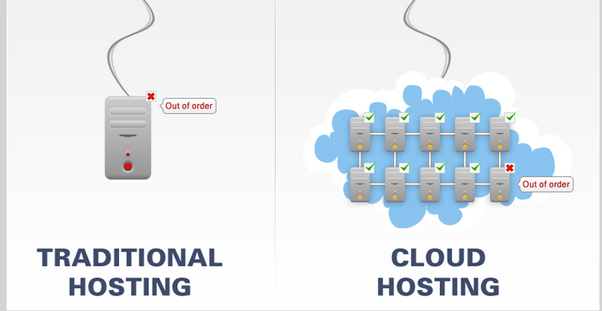Cloud Hosting vs. Reseller Hosting: Which One Is Good?
Read this article to learn about, ‘Cloud Hosting vs. Reseller Hosting: Which One Is Good?’.

What is Cloud Hosting?
“Cloud services” refers to a subset of hosted services that are delivered via the cloud. Everything from the server to the storage to the networking to the composite solutions is provided by a cloud provider.
The fact that they are shared amongst many users at once is a key distinction between this type of hosted service and others. Because of this lack of collaboration, a private server hosted by a vendor and accessed by a client over VPN would not be considered cloud hosting.
Advantages of Cloud Hosting
a) There are less operational issues with cloud computing.
b) It is economical to use cloud computing
c) Saving money is easier with cloud computing.
d) Cloud computing encourages greater teamwork by facilitating easier sharing of resources and information.
e) Businesses with cloud computing have a less carbon footprint.
f) Computers in the cloud are always connected to the internet
g) Workers can improve their work-life balance because to cloud computing.
h) Secureness in the cloud is improved in number eight.
i) Cloud computing makes it simple for businesses to manage their data.
j) No special hardware or software installation is required to use cloud computing.
What is Reseller Hosting?
Reseller Hosting is the perfect option for anyone interested in beginning their own web design/development company or reselling hosting services to others. The owner (reseller) pays for a hosting package that includes storage space and data transfer with Reseller Hosting. After you’ve bought web hosting, you can recoup some of your investment by renting out space on your server to other businesses. Because of this, in Reseller Hosting, the hosting reseller earns money by providing hosting services to its clients.
Advantages of Reseller Hosting
a) Very simple to implement and control
b) Easy to understand even without technical training
c) Inexpensive and straightforward to improve
d) Includes a skin-editing interface and multiple colour schemes.
e) Possibility of centralised administration for all client websites.
f) Both the reseller and the end-user have access to the control panel.
Cloud Hosting vs. Reseller Hosting: Which One Is Good?
Startups, small web design firms, and freelancers can all benefit from reseller hosting. Small websites that receive fewer than 1,000 unique visits every day are acceptable hosts. It doesn’t take a tech whiz to figure out how to utilise it. Companies that allow you to resell hosting space offer full administration and setup assistance. Once your reseller account is up and running, the first thing you should do is obtain private nameservers. Identifying a reliable reseller hosting service might be challenging. Don’t make a blunder by not putting in enough time and effort. It’s not uncommon for web hosts to go out of business. Choose one that has a proven track record and has been operational for at least three years. While reseller hosting has its advantages, a modest cloud server should be your first consideration if you’re serious about launching a web hosting business.
Hosting on a cloud server is best for large organisations and individuals who want to host high-traffic websites with more than 2,000 visits per day. The increased availability of resources isn’t the only perk of using a cloud server. You will have complete administrative access to your very own server. Your websites will be housed on cutting-edge servers, and you’ll only be charged for the resources you really use. It’s important to remember that not all cloud hosting companies have cloud hosting clusters that are correctly setup. Don’t be afraid to swap servers if you obtain one and find that it’s too slow or that assistance is inadequate. Hosting your site in the cloud is far more reliable and faster than any other option. For that reason, more and more companies are making the conversion every day.
Comparing cloud hosting with its reseller counterpart reveals several distinctions. When using cloud hosting, your files will be kept in several different locations. If you require several hosting accounts or want to create your own web hosting company, reseller hosting is the way to go. From the reseller hosting control panel, you can set up hosting packages for individual customers. Custom bundles are also possible to develop.
Comparing cloud services to traditional hosted services, the most notable advantage is the cost-effectiveness and scalability of the former. When you use cloud services, you share the cost of the data center’s hardware and upkeep with potentially hundreds, thousands, or millions of other customers.
Since it doesn’t require the deployment of extra resources or servers for a cloud provider to satisfy growing data needs, cloud services are typically extremely scalable. It’s as simple as giving the client access to more information.
When compared to older hosted solutions, cloud services are more likely to have the latest and greatest in terms of performance and security. Since cloud companies’ income is contingent on a large number of satisfied customers, they have a vested interest in keeping their customers’ data secure. In many cases, this is the most effective method for keeping your technology safe.
CONCLUSION
After reading this article, you might have got a good idea about, Cloud Hosting vs. Reseller Hosting: Which One Is Good? You can also read this article to learn about, Reseller vs. Shared Hosting: what’s the difference?
You can read this article to know how to buy Admin RDP.
Visit 99rdp.com to know about the pricing plan of Cheap RDP.




